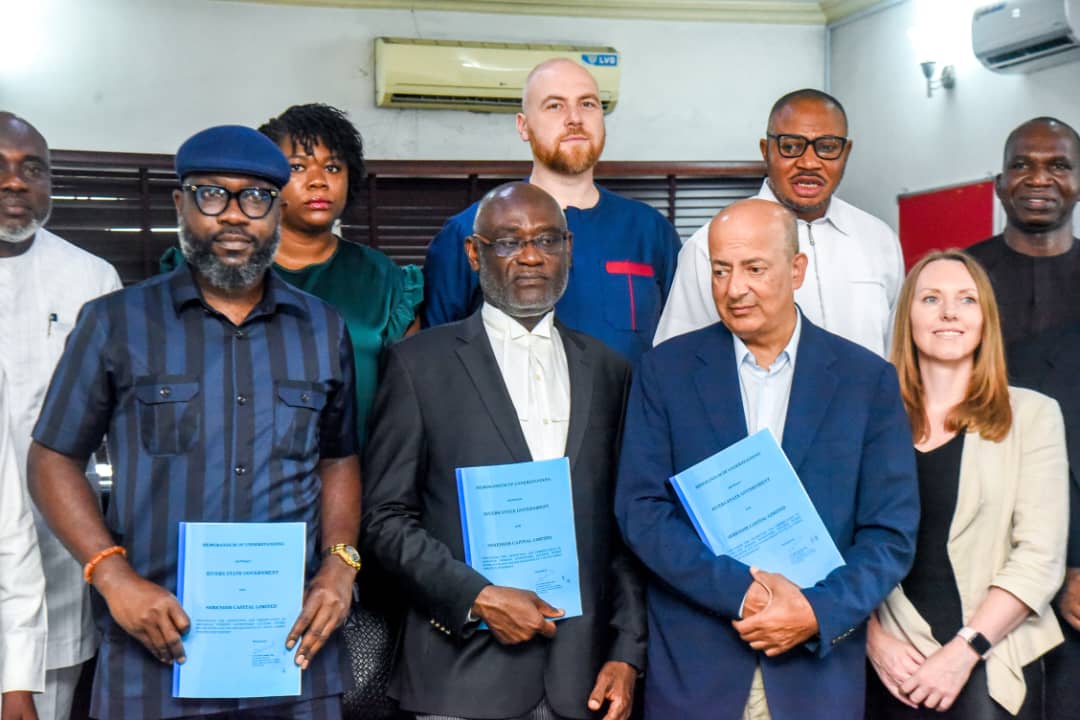
L-R: Hon. Uche Maximus Nwafor (Commisioner For Energy), Dagogo Israel Iboroma, SAN (Attorney General Of Rivers State), Mr. Rafat Rizvi (Managing Partner & Chief Executive Officer Serendib Capital Limited)
Rivers State Government and Serendib Capital, Eight Versa, and PIND (Foundation for Partnership Initiatives in the Niger Delta) have signed a 30 years Memorandum of Understanding (MoU) to launch a large-scale mangrove restoration and conservation project in the state.
The mangrove restoration project, which covers 240,000 hectares of seagrass, aimed to become the world’s largest blue carbon project, integrating mangrove restoration, seagrass conservation next to 170,000 hectares of mangrove, sustainable agriculture, tree planting, biochar production, and others.
The project would be part of a larger mangrove marine ecosystem restoration program known as Delta AZURE which be the world’s largest blue carbon project.
Speaking after the signing of the MoU, yesterday in Port Harcourt, Commissioner for Energy and Natural Resources in Rivers State, Maximus Uchechukwu Nwafor, noted that the project would benefit the state and increase its revenue.
Nwafor stated: “We have signed an MoU with Serendib Capital, which will benefit our state and increase our revenue. I would like the Managing Director to further acquaint us with the project’s details.
“We have requested that they provide us with all necessary requirements, including security and other aspects. Once we receive this information, we will ensure the project’s success.”
Rafat Rizvi Chief Executive Officer(CEO) Serendib Capital after signing the MoU explained that the collaborative effort seeks to drive transformative environmental and socio-economic gains in Rivers State, serving as a model for future mangrove restoration projects globally.
Rizvi said the project’s launch marks a significant step towards preserving Nigeria’s vital mangrove ecosystems and promoting sustainable development in the oil region.
Rizvi further stated that the mangrove restoration project aims to prevent the deforestation of 170,000 hectares of forest through afforestation, reforestation, and revegetation, adding that the effort is part of the larger Delta AZURE program, poised to become the world’s largest blue carbon project.
He said, “Nigeria’s mangrove forests, spanning 10,500 km, are the largest in Africa and third-largest globally. These vital ecosystems provide biodiversity support, flood prevention, coastal erosion protection, and carbon sequestration.
“They face severe degradation, with the Niger Delta region losing approximately 40% of its mangrove forest between 1996 and 2016,” he said.
He said the conservation project would generate carbon credits, providing an alternative income source for local communities and supporting their involvement.
He said: “The credits will also bring tangible benefits to the state and contribute to the global fight against climate change. The initiative underscores the importance of preserving Nigeria’s mangrove forests, which are crucial for coastline defense, pollution filtration, and carbon sequestration.
“By safeguarding these ecosystems, the project ensures the long-term health of the planet and the well-being of local communities.”
In Rizvi’s estimations, the mangrove restoration project would prevent the deforestation of 170,000 hectares of forest through Afforestation, Reforestation and Revegetation and replantation. The project would be part of a larger mangrove marine ecosystem restoration program known as Delta AZURE which be the world’s largest blue carbon project.
On the 30th July 2024, Serendib Capital’s first office in Nigeria was commissioned by His excellency RT. HON. (ELDER) Sheriff F.O. OBOREVWORI. This action shows the commitment of the organization to the agreements spelled out in the Memorandum of understanding signed in February 2024. And now Serendib is set to expand its efforts into Rivers State.
Nigeria’s mangrove forests span an area of 10,500 km², making them the largest in Africa, and the third-largest globally.
These mangroves are crucial for a range of vital ecosystem services, including biodiversity support, flood prevention, coastal erosion protection and carbon sequestration.
Despite their importance, there has been a concerning degradation of these forests worldwide. From 1996 to 2016, the Niger Delta region alone witnessed a loss of approximately 40% of its mangrove forest which is equivalent to over 65 million dollars
Disclaimer
Comments expressed here do not reflect the opinions of Vanguard newspapers or any employee thereof.